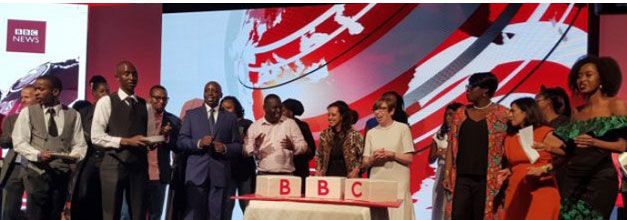
Nicolas Pompigne-Mognard, the founder and chairman of APO Group, a top media relations consultancy and press release distribution firm in Africa and the Middle East was in Kampala in early April to talk to journalism students about the current media landscape on the continent that has seen international media organizations such as the BBC, CNN, The Washington Post, CGTN, Al Jazeera invest massively in Africa. Before he left for Lusaka, Zambia, Pompigne-Mognard shared his reflections with The Independent’s Ronald Musoke.
When the British Broadcasting Corporation last November opened its US$370 million state-of-the-art bureau in Nairobi— the largest office outside the UK—Pompigne-Mognard sat back and fretfully reflected on the new development.
The BBC’s outlay only added to the growing list of big international media companies that are deliberately investing millions of dollars on the continent.
Pompigne-Mognard, a French-Gabonese entrepreneur says the international media is being lured to the continent by the fast-growing population.
A recent UN demographic report, for instance, shows that Africa’s population will double to 2.4 billion by 2050 and that 40% of all humanity will live in Africa by the turn of the century.
Similarly, global management consultancy firms like McKinsey have also predicted that Africa is poised for economic acceleration similar to the Asian boom; something that Pompigne-Mognard says is shown by the recent investment trends of large multi-national companies on the continent.
For decades, he says, hundreds of American and German companies have been operating in South Africa but most of them are now planningto expand north of the River Limpopo to get a slice of the untapped market.
“This will obviously translate into more media spending, especially if you consider a growing trend where communicators are re-evaluating their mix of advertising versus public relations,” he says.
“The Washington Post recently announced that they would be expanding in Africa. In France, so many media outlets like Le Monde are opening African sections; The Huffington Post launched its version in North Africa not to mention CNN which now has six programmes dedicated to Africa,” he told The Independent.
“They are coming or expanding not in Paris, Washington, or Beijing but in Africa.”
Tough times for local media
Regrettably, this development is coming at the time the media industry in Africa is struggling with digitization, monetization and talent management. To make the situation even worse, more Africans are turning to the international media outlets for news and other services.
“If the trend of Africans wanting to spend more time watching international media persists, the advertisers of multi-national companies will end up advertising with the international media,” he says.
“If I am Coca Cola and I have a choice between several media houses in Uganda, Kenya or Nigeria and one international outlet like CNN which has a far bigger reach, I would choose CNN.”
“The French say when there is a crisis, the fat grow thinner and the thin just die. We know the media in Africa is already thin, so what happens when you give more money to a competitor?” he added.
These thoughts, Pompigne-Mognard’s says, have pre-occupied his mind since he left his position as Chief Executive Officer of APO-Group towards the end of last year.
He has now embarked on a mission, travelling around the continent to meet with media owners, practicing journalists and journalism students.In March this year, he travelled to Senegal, before crossing to Uganda and Zambia.
“We are discussing what sort of impact this outlay of investments by international media organizations could have on the media landscape in Africa,” he said.
“You have an African media already facing challenges and then you see so many international media coming from outside Africa and investing massively, if they manage to attract and divert some of the revenue which could have ended up in the coffers of several international media, it will be extremely detrimental to African media.”
This trend, he says, will reshape the media landscape in ten years’ time because, “we unfortunately live in a world where those who have more money usually win.”
“By the way these media companies are not coming here for philanthropy, they are here for business; they see potential on the continent,” he said.
“It means, for instance, that the African media will not have the means to finance digitization or invest in funding the relevant models to make money. Secondly, they will not be able to pay top talent because the best talent will end up at BBC, CNN or CGTN.”
It is not the first time Pompigne-Mognard has peered into the future and made a prediction. Ten years ago, while still a budding journalist, he visited the European headquarters of PR Newswire, in London which at the time was considered the leading global press release distribution service.
“I explained to several of their senior managers how Africa would soon represent a huge market for press releases and why it was time for them to invest in the continent.”
Pompigne-Mognard says the managers just laughed. Ten years later, APO Group is receiving purchase offers, strategic partnership offers, merger and acquisition transaction offers from some of the leading players in the industry.
 The Independent Uganda: You get the Truth we Pay the Price
The Independent Uganda: You get the Truth we Pay the Price



